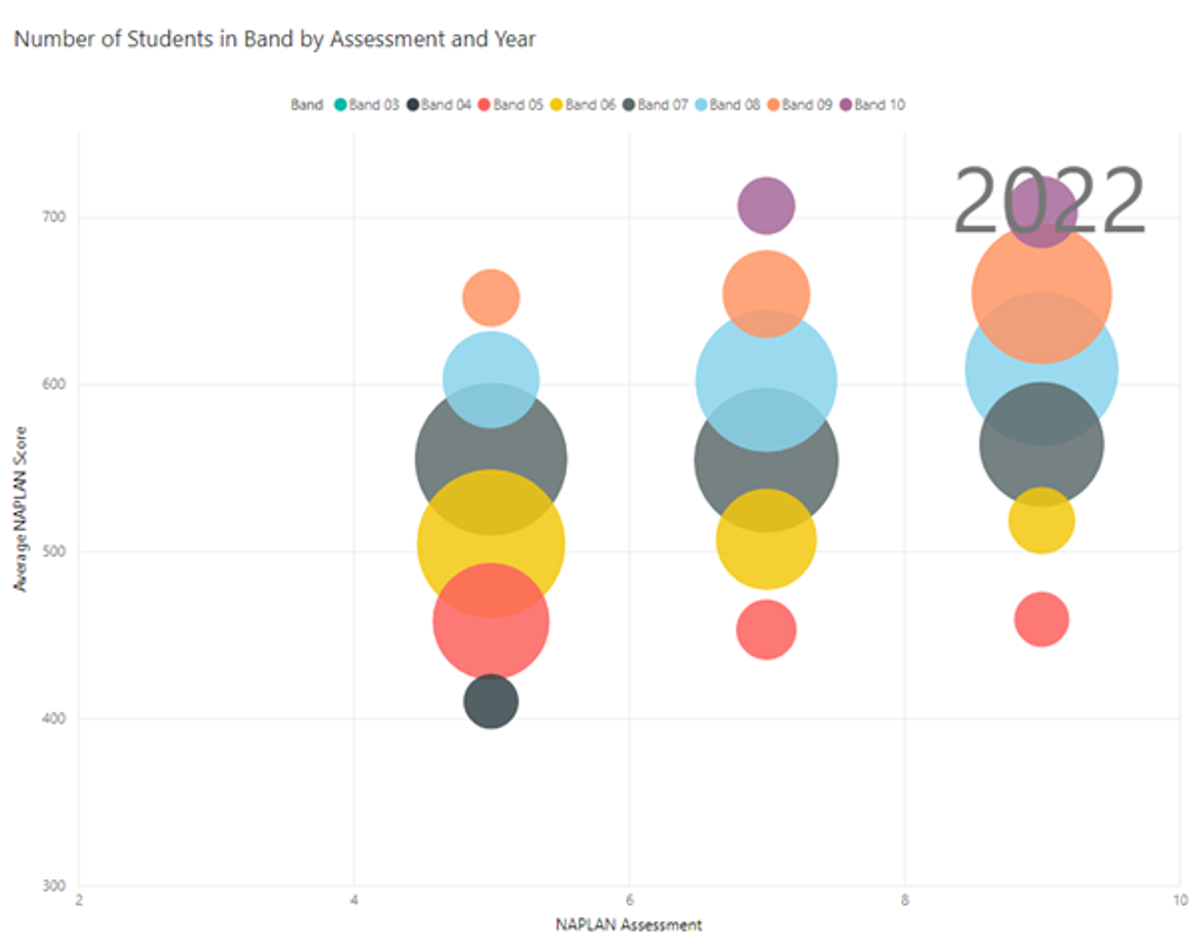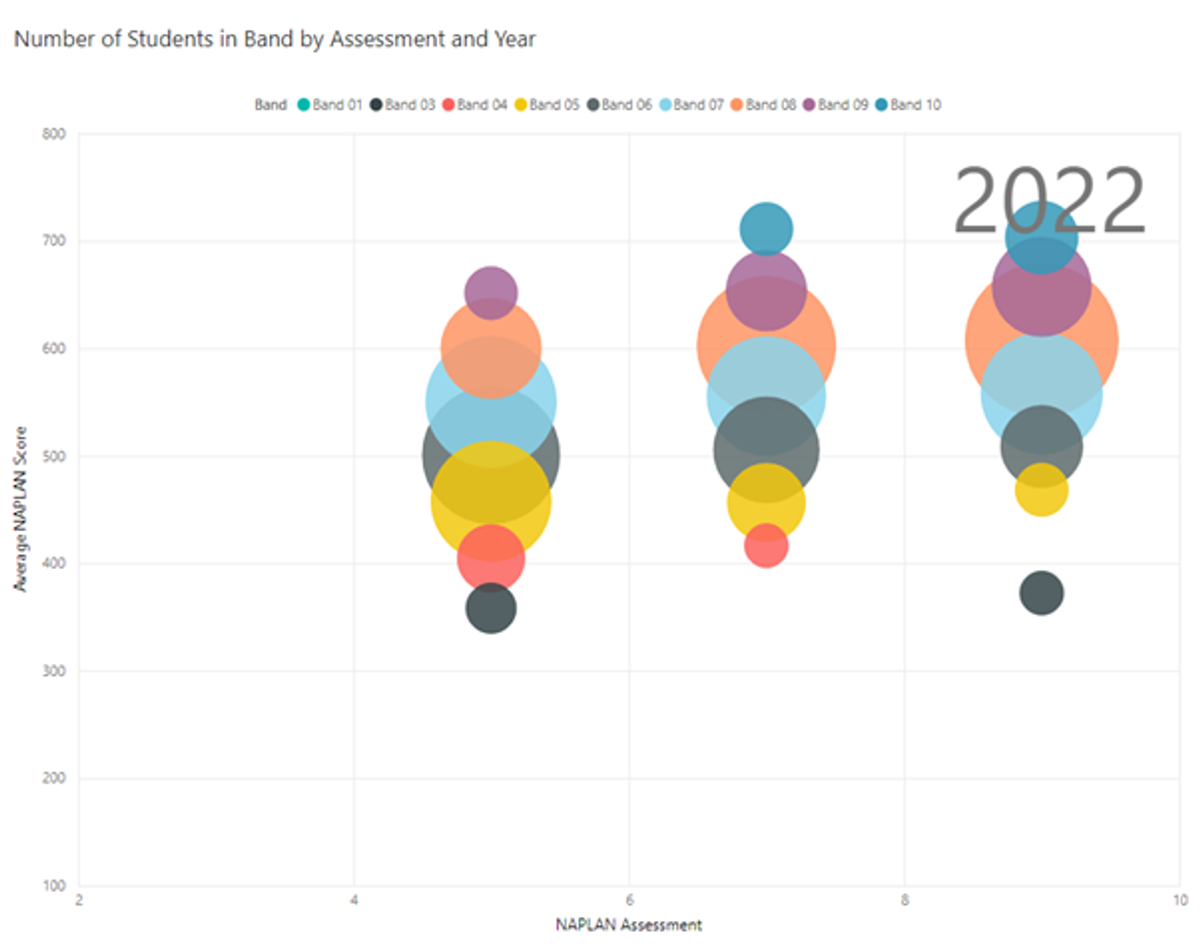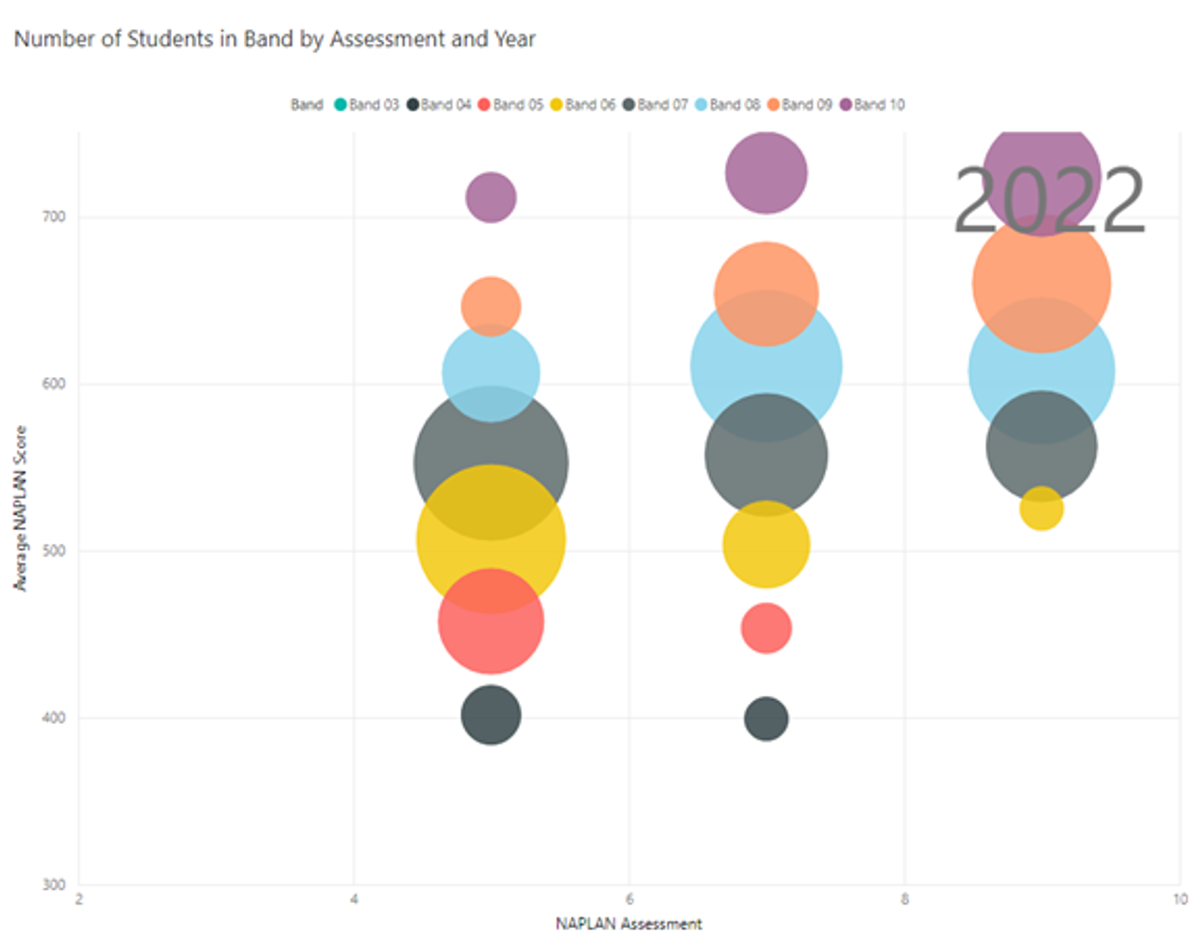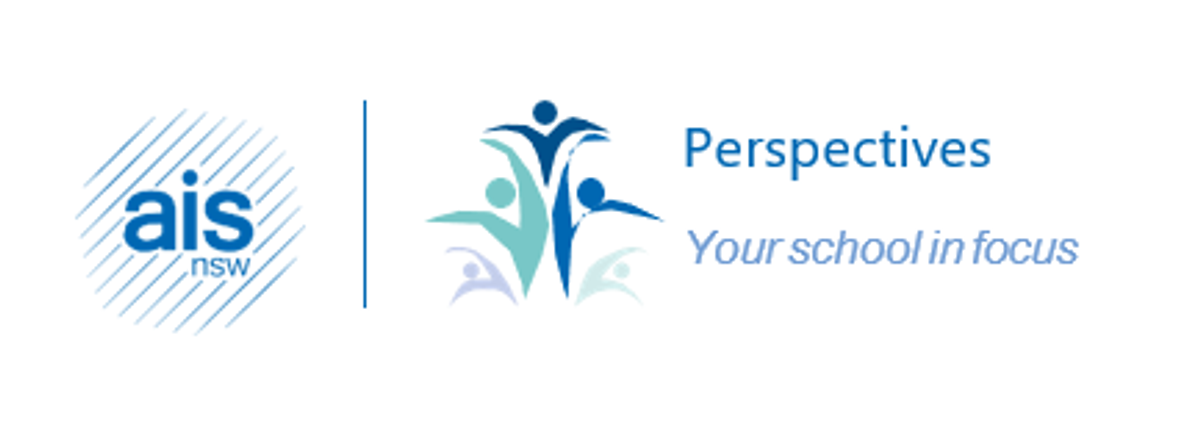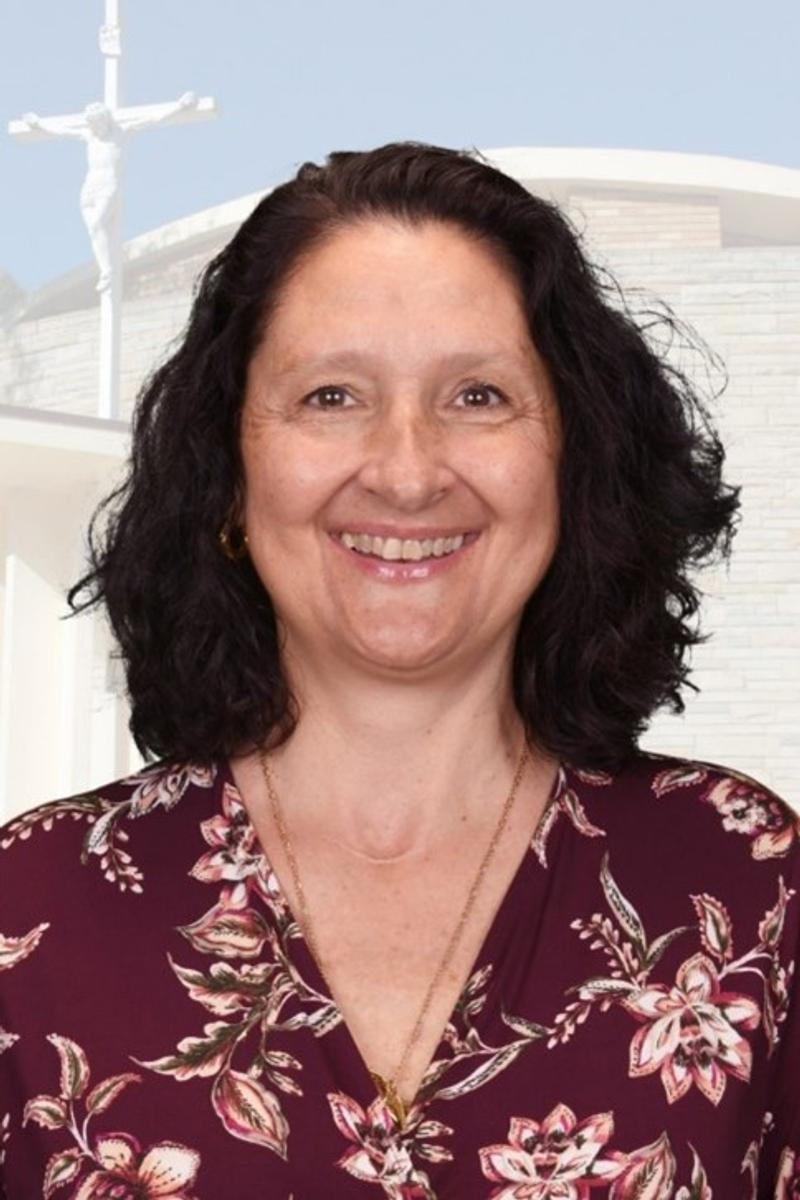Principal

NAPLAN 2022
Even though the online NAPLAN tests were plagued with serious technical issues, the College is pleased with the progress students are making. The results correlate with our Allwell Testing results and enable us to track progress.
I have included a simple visual representation of our results in Reading, Writing and Numeracy, in the form of a Bubble Chart. This bubble chart displays the distribution of NAPLAN scores for each assessment at a school.
We have NAPLAN scores for Years 5, 7 and 9.
The x-axis displays the NAPLAN assessment – 5, 7 or 9. Note that the axis also shows scholastic years with no assessment, e.g. 6 and 8. This is a report limitation and cannot be changed.
The y-axis displays the average NAPLAN score at that school in the selected year.
One bubble represents one band, e.g. Band 3.
The size of the bubble represents the number of students at the school who achieved in that band.
READING
WRITING
NUMERACY
Using these bubble charts, you can see at a quick glance how each cohort is tracking. You can see that as the students progress through the College, they are achieving more strongly and we are enormously proud of the work our learning support staff have done to assist students with learning needs to progress.
We need to keep working on writing across the College. While we have seen growth, we cannot rest on our laurels and writing will continue to be targeted across the school.
Does NAPLAN help children succeed academically?
NAPLAN results are upon us again, arriving as they do every year at the end of Term 3. Too late to be of any real value as we now only have eight weeks left to implement any intervention strategies. And while many parents/carers, teachers, and students are generally ambivalent and nonchalant about this ’high-stakes’ $100 million plus test, others take NAPLAN very seriously.
For those who are focused on NAPLAN results, there are NAPLAN preparation books for sale in stores around the country. Learning time in class is being disrupted so students can practice taking NAPLAN exams. And to highlight how high the stakes are in some families, “I’m buying my daughter a puppy if she scores in the top band” one mother informed me.
But is NAPLAN useful for understanding your child’s academic capability? How helpful is NAPLAN when it comes to your child receiving an excellent education?
The short answer: not very.
The trouble with NAPLAN
Since its inception, NAPLAN has been contentious, for several reasons. Let me summarise, very briefly, some of the main concerns about NAPLAN:
- There have been statistical and moral questions raised about the fairness, equity, reliability, and validity of NAPLAN for many years. (Too many to go into here, but important to mention.)
- NAPLAN is a ranking system… but education should not be about ranking or competition. It should be about teaching and development, mastery and competence.
- Kids get stressed about the test. While it’s true that kids get stressed about tests all the time – and they do need to learn to manage that stress – NAPLAN seems to create high levels of stress, and based on the points above, it’s unnecessary.
- NAPLAN has been blamed for kids missing class learning, opportunities to perform musicals, sports, and more due to an ever-crowded curriculum and the push for better results.
- It is not helpful to use NAPLAN diagnostically. The test is completed in May and results are returned at the year’s end. To know how your child is performing at school it’s more helpful to ask the teacher than to wait for a NAPLAN result.
- You can actually guess how a school will perform based on the average income of the parents whose children attend.
- The online testing this year was fraught with technical issues. There was nothing we, nor the students, could do when the test would “freeze”. The Australian Government has to deal with this issue for 2023 so that it is an easier experience for students.
Additionally, NAPLAN doesn’t tell us anything helpful about a school other than how its students scored on that test. It tells us nothing about the teachers and their involvement with students, the culture of the school, what happens on the playground, or how students feel while they’re at school.
For all these reasons – and more – the Gonski Institute for Education issued a report last year suggesting that NAPLAN be scrapped!
If you want your children to thrive at school, NAPLAN results aren’t a useful measure. But fortunately, we know what is.
Helping Children Thrive at School
The following factors generally matter most when it comes to your child doing well at school:
- Reading. If there is only one thing that you do with your children for their education, read to them. This should start as young as possible and continue through toddler years, preschool years, and into big school. Read to them – and have them read to you – as they go through their early primary years. And keep books around right through high school. Reading is one of the best predictors of children’s academic success, and it is associated with increased resilience, particularly for kids from challenged or traumatic backgrounds.
- Be involved. Research shows that parents/carers who ask about school, check in on what students are learning, talk with the school teacher from time to time, and continue to monitor and stay up to date on what is happening at school have children who do better academically when compared with students whose parents/carers are uninvolved. Getting involved shows you care.
- Relationships with peers. Children who enjoy a sense of school belonging, according to Dr Kelly Allen at Monash University, do better at school. They also have higher levels of life satisfaction.
- A sense of progress and purpose. These are two separate things, but I’m including them together because they often follow one another. When our children make progress, they feel competent and capable. This increases their motivation, and makes school feel purposeful. If parents/carers can work to help children see the progress they’re making, it will boost desire for more progress, and the work becomes easier and more enjoyable.
- People who love them. There is no way of getting around this fact: kids do well for those they love. When a student loves his science teacher, Science becomes the best subject ever and he tries hard as a result. Same goes with PE, English, or any other subject. Helping children feel like they are known, numbered, and missed combined with teachers who are enthusiastic about their topics, helps kids do better at school.
Often people will say, “But what about my child?” So many parents/carers are dealing with ADHD, autism, ODD, sensory issues, depression, or other additional health or developmental needs. My response is always the same: those points above become even more vital. Read, be involved, help them make friends, challenge them to progress and find purpose, and make sure someone loves them.
Your child may have sat the NAPLAN test in May this year. Let them know that when they receive their results, that it’s not about them. It’s for the school only. Don’t make a big deal about their results when they show up. It’s old news by then. And when it’s done, give them a hug, share a milkshake, and ask them about their friends, their teacher, or their favourite book to read… because those things will matter more for their education than their performance on this year’s NAPLAN test.
Annual Surveying of our Community Stakeholders
Our school is using the Perspectives: Your school in focus suite of surveys developed by AISNSW to support our school improvement endeavours. The information gathered will assist in furthering the growth and development of our school community. We will use the survey results to help inform and direct future school planning and improvement strategies.
These surveys have been specifically designed to assist schools in gaining an understanding of stakeholders’ perceptions of five important areas: School Environment, Teaching and Learning, Student Wellbeing, Leadership and Community. All staff, students, parents/carers, leaders and Advisory Council members will be invited to participate.
The surveys were made available this week from Monday 10 October to Friday 21 October 2022 and are conducted online, taking approximately 20 minutes to complete.
Your input and contribution are important to the success of our continuous school improvement process as we aspire to improve the learning experience for everyone at our school.
For any enquiries about the surveys please contact my Executive Assistant, Cristina Polito (cristina.polito@spc.nsw.edu.au) at the College for more details.
Staff Changes
Welcome to New Staff
- We welcome Ms Giulia Ralton to the Junior School team who is replacing Yolanda D’Onofrio while she is on parental leave. Ms Ralton will be job-sharing with Ms Holly Davidson.
- The Junior School team will also have Mr Zachary Tropeano joining its ranks as he replaces Mr Mark Leary who is on Long Service Leave.
- Ms Natasha Mascolo (Languages) will also be on Long Service Leave and replaced by two people, Ms Solange Villanueva-Alvarez and Mrs Emilia Crino.
Other Staffing News
- Ms Romina Fisicaro will be returning from parental leave on a flexible work arrangement as a 0.6 FTE teacher.
- Ms Melissa Shannon will be returning to the staff of the College in a full-time capacity as the (Acting) Head of Science from Week 3, Term 4 when Mrs Surekha Chander commences her Long Service Leave.
School Fees 2022
A reminder to all parents and carers that we would appreciate a finalisation of all outstanding monies to the College as soon as possible.
If you are having difficulties in meeting your financial obligations to the College, please contact our Director of Business Services, Ms Arraj as soon as possible. Once you complete a fee relief form, substantiated with financial documentation, the College will work towards the development of a payment plan.
An EREA education will not be denied to families with genuine cases of hardship. Rather, the College will do all it can to facilitate a sensitive and practical fee payment plan that assists each family. But we do need to know what is going on! So please – reach out to us first. We understand how hard this is, however, we will deal with you discretely and in confidence.
Leadership Team Member Recognised by ACEL
Congratulations to Mrs Denise Lombardo (Director of Learning and Innovation) on being recognised in this year’s Australian Council for Educational Leaders (ACEL) NSW Leadership Awards. As Australia’s peak professional organisation for educational leaders, the Australian Council for Educational Leaders has a strong reputation for recognising, developing, and celebrating excellence in educational leadership. It is through such an award that ACEL NSW honours those who have made a significant contribution to education, educational leadership and the improvement of child or student learning outcomes, teacher professional practice and/or effectiveness. It is a great privilege that her contribution to our important profession is being honoured. She will receive her award at the NSW ACEL Awards ceremony on Friday, 21 October 2022 where she will be one of
the guests of honour.
Community Prayers
Over the break, Mr Nicholas Phillipson, Head of Visual Arts, lost his mother after a battle with a respiratory illness. We keep him and his family in our prayers in the faithful hope that she now sits in the palm of Our Lord’s hand.
We also continue to pray for Mrs Eliana Barnes, a much-loved member of our Uniform Shop staff. She is currently recuperating in hospital after surgery and making a slow and steady recovery.
Dr Vittoria Lavorato
Principal
SPC boys can do anything!
**except divide by zero

